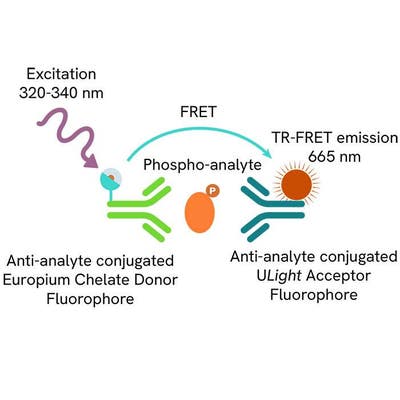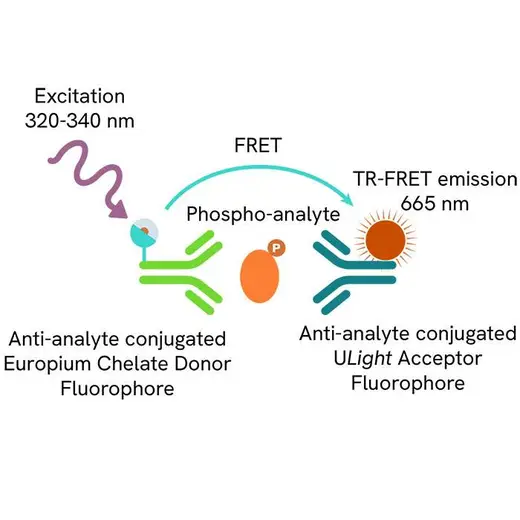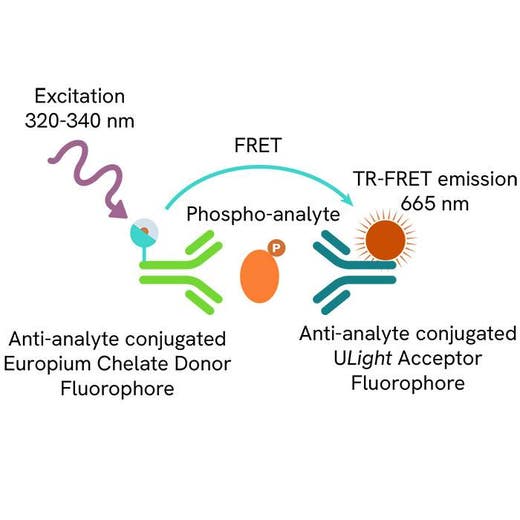
LANCE Ultra Phospho-LCK (Tyr394) Detection Kit, 10,000 Assay Points

LANCE Ultra Phospho-LCK (Tyr394) Detection Kit, 10,000 Assay Points




LANCE Ultra phospho-LCK (Tyr394) kits are designed for the detection of phosphorylated LCK in cell lysates using a simple, homogeneous LANCE Ultra assay (no wash steps). This assay is compatible with both adherent and suspension cells.
For research use only. Not for use in diagnostic procedures. All products to be used in accordance with applicable laws and regulations including without limitation, consumption and disposal requirements under European REACH regulations (EC 1907/2006).
| Feature | Specification |
|---|---|
| Application | Cell Signaling |
| Sample Volume | 15 µL |
LANCE Ultra phospho-LCK (Tyr394) kits are designed for the detection of phosphorylated LCK in cell lysates using a simple, homogeneous LANCE Ultra assay (no wash steps). This assay is compatible with both adherent and suspension cells.
For research use only. Not for use in diagnostic procedures. All products to be used in accordance with applicable laws and regulations including without limitation, consumption and disposal requirements under European REACH regulations (EC 1907/2006).


LANCE Ultra Phospho-LCK (Tyr394) Detection Kit, 10,000 Assay Points


LANCE Ultra Phospho-LCK (Tyr394) Detection Kit, 10,000 Assay Points


Product information
Overview
Please note control lysates are sold separately, catalog number TRF4026S.
Formats:
- Our 500 assay point kit allows you to run 500 wells in 384-well format, using a 20 µL reaction volume.
- Our 10,000 assay point kit allows you to run 10,000 wells in 384-well format, using a 20 µL reaction volume.
LANCE® and LANCE® (Lanthanide chelate excite) Ultra are homogeneous (no wash) TR-FRET (time-resolved fluorescence resonance energy transfer) technologies. One antibody of interest is labeled with a donor fluorophore (a LANCE Europium chelate) and the second antibody is labeled with an acceptor fluorophore [ULight™ dye]. Upon excitation at 320 or 340 nm, energy can be transferred from the donor Europium chelate to the acceptor fluorophore if sufficiently close for FRET (~10 nm). This results in the emission of light at 665 nm. Data are represented as ratiometric (665/615 nm X 10,000).
LCK is a cytoplasmic phosphoprotein from the Src family of non-receptor tyrosine kinases. LCK regulates T cell activation by associating with CD4 and CD8 surface receptors on T cells. Phosphorylation at Y394 enhances kinase activity. LCK is associated with Immunodeficiency 22 and CD45 deficiency. No-death receptor apoptosis is also involves LCK.
Specifications
| Application |
Cell Signaling
|
|---|---|
| Automation Compatible |
Yes
|
| Brand |
LANCE Ultra
|
| Detection Modality |
LANCE
|
| Molecular Modification |
Phosphorylation
|
| Product Group |
Kit
|
| Sample Volume |
15 µL
|
| Shipping Conditions |
Shipped in Blue Ice
|
| Target |
LCK
|
| Target Class |
Phosphoproteins
|
| Technology |
TR-FRET
|
| Unit Size |
10,000 Assay Points
|
Resources
Are you looking for resources, click on the resource type to explore further.
STAT3 is a particularly important therapeutic target since it is constitutively active in a range of cancer cells lines and human...


How can we help you?
We are here to answer your questions.






























